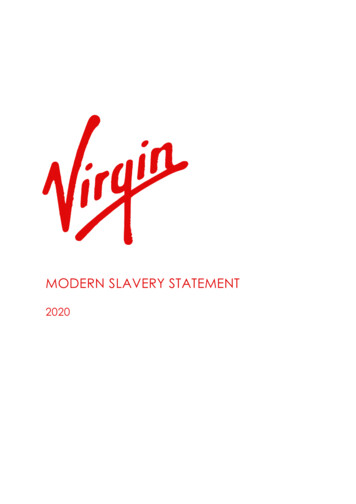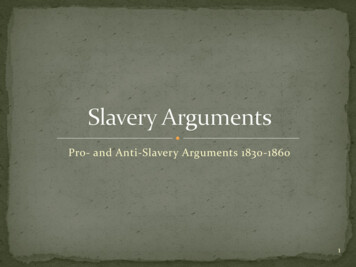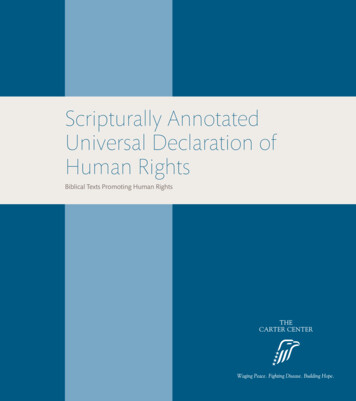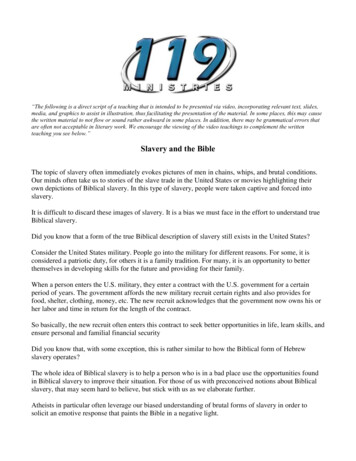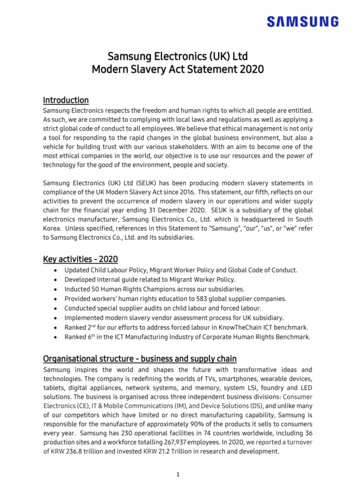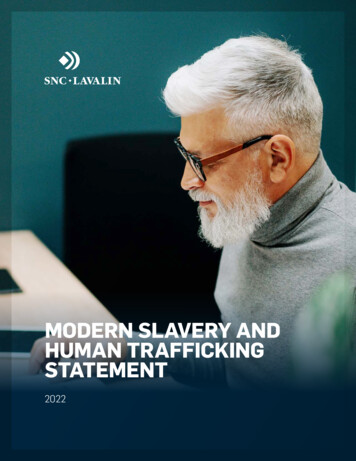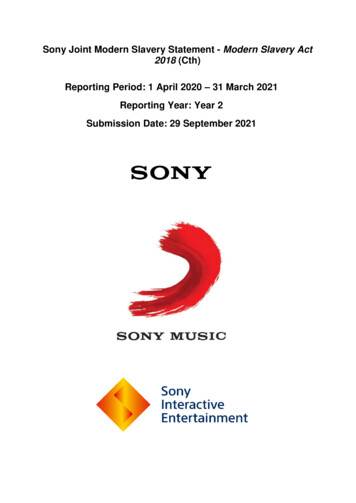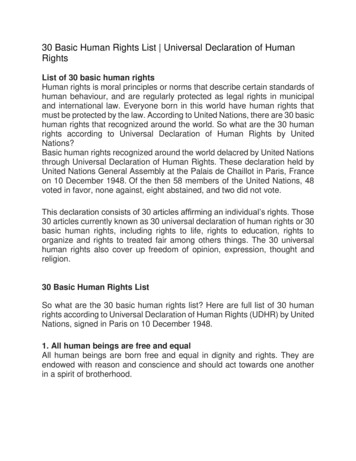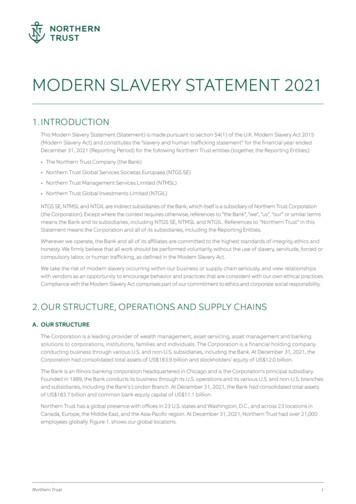
Transcription
MODERN SLAVERY STATEMENT 20211. INTRODUCTIONThis Modern Slavery Statement (Statement) is made pursuant to section 54(1) of the U.K. Modern Slavery Act 2015(Modern Slavery Act) and constitutes the “slavery and human trafficking statement” for the financial year endedDecember 31, 2021 (Reporting Period) for the following Northern Trust entities (together, the Reporting Entities): The Northern Trust Company (the Bank) Northern Trust Global Services Societas Europaea (NTGS SE) Northern Trust Management Services Limited (NTMSL) Northern Trust Global Investments Limited (NTGIL)NTGS SE, NTMSL and NTGIL are indirect subsidiaries of the Bank, which itself is a subsidiary of Northern Trust Corporation(the Corporation). Except where the context requires otherwise, references to “the Bank”, “we”, “us”, “our” or similar termsmeans the Bank and its subsidiaries, including NTGS SE, NTMSL and NTGIL. References to “Northern Trust” in thisStatement means the Corporation and all of its subsidiaries, including the Reporting Entities.Wherever we operate, the Bank and all of its affiliates are committed to the highest standards of integrity, ethics andhonesty. We firmly believe that all work should be performed voluntarily, without the use of slavery, servitude, forced orcompulsory labor, or human trafficking, as defined in the Modern Slavery Act.We take the risk of modern slavery occurring within our business or supply chain seriously, and view relationshipswith vendors as an opportunity to encourage behavior and practices that are consistent with our own ethical practices.Compliance with the Modern Slavery Act comprises part of our commitment to ethics and corporate social responsibility.2. OUR STRUCTURE, OPERATIONS AND SUPPLY CHAINSA. OUR STRUCTUREThe Corporation is a leading provider of wealth management, asset servicing, asset management and bankingsolutions to corporations, institutions, families and individuals. The Corporation is a financial holding companyconducting business through various U.S. and non-U.S. subsidiaries, including the Bank. At December 31, 2021, theCorporation had consolidated total assets of US 183.9 billion and stockholders’ equity of US 12.0 billion.The Bank is an Illinois banking corporation headquartered in Chicago and is the Corporation’s principal subsidiary.Founded in 1889, the Bank conducts its business through its U.S. operations and its various U.S. and non-U.S. branchesand subsidiaries, including the Bank’s London Branch. At December 31, 2021, the Bank had consolidated total assetsof US 183.7 billion and common bank equity capital of US 11.1 billion.Northern Trust has a global presence with offices in 23 U.S. states and Washington, D.C., and across 23 locations inCanada, Europe, the Middle East, and the Asia-Pacific region. At December 31, 2021, Northern Trust had over 21,000employees globally. Figure 1. shows our global locations.Northern Trust1
MODERN SLAVERY STATEMENTCHART 1: NORTHERN TRUST LOCATIONS AS OF DECEMBER 31, OLMLIMERICKBEIJINGABU NGALURUMANILAKUALA LUMPURSINGAPOREHONG KONGSYDNEYMELBOURNE* In the U.S., Northern Trust has offices in 23 states and Washington D.C. Its headquarters is located in Chicago, Illinois.A large proportion of Northern Trust’s employees around the world work in our business units to deliver our productsand services – see the “Operations” section below. Our other employees provide support and expertise to the Bank inareas including risk management, compliance, technology, legal, finance, and human resources. The large majority ofour employees are full-time, permanent employees in professional and desk-based roles.B. OPERATIONSBusiness OverviewNorthern Trust focuses on managing and servicing client assets through two client-focused segments: Corporate& Institutional Services (C&IS) and Wealth Management. Asset management and related services are provided toC&IS and Wealth Management clients primarily by the Asset Management business.C&IS is a leading global provider of asset servicing and related services to corporate and public retirement funds,foundations, endowments, fund managers, insurance companies, sovereign wealth funds, and other institutional investorsaround the globe. Asset servicing and related services encompass a full range of capabilities including but not limitedto: custody; fund administration; investment operations outsourcing; investment management; investment risk andanalytical services; employee benefit services; securities lending; foreign exchange; treasury management; brokerageservices; transition management services; banking; and cash management. Client relationships are managed through theBank and the Bank’s and the Corporation’s other subsidiaries, including support from locations in North America, Europe,the Middle East, and the Asia-Pacific region. At December 31, 2021, total C&IS assets under custody/administration, assetsunder custody, and assets under management were US 15.18 trillion, US 11.55 trillion, and US 1.19 trillion, respectively.Wealth Management focuses on high-net-worth individuals and families, business owners, executives professionals,retirees, and established privately-held businesses in its target markets. In supporting these targeted segments, WealthManagement provides trust, investment management, custody, and philanthropic services; financial consulting;guardianship and estate administration; family business consulting; family financial education; brokerage services;and private and business banking.Northern Trust2
MODERN SLAVERY STATEMENTWealth Management also includes Global Family Office, which provides customized services, including but not limitedto investment consulting; global custody; fiduciary; and private banking to meet the complex financial needs of ultrahigh-net-worth individuals and family offices across the globe. Wealth Management is one of the largest providers ofadvisory services in the U.S., with assets under custody/administration, assets under custody, and assets under managementof US 1.07 trillion, US 1.06 trillion, and US 416.1 billion respectively at December 31, 2021. Wealth Management servicesare delivered by multidisciplinary teams through a network of offices in 19 U.S. states and Washington, D.C., as well asoffices in London, Guernsey, and Abu Dhabi.Asset Management, through the Corporation’s various subsidiaries, supports the C&IS and Wealth Managementreporting segments by providing a broad range of asset management and related services and other products toclients around the world. Investment solutions are delivered through separately managed accounts, bank commonand collective funds, registered investment companies, exchange traded funds, non-U.S. collective investment funds,and unregistered private investment funds. Asset Management’s capabilities include active and passive equity; activeand passive fixed income; cash management; multi-asset and alternative asset classes (such as private equity andhedge funds of funds); and multi-manager advisory services and products. Asset Management’s activities also includeoverlay services and other risk management services. Asset Management operates internationally through subsidiariesand distribution arrangements and its revenue and expense are fully allocated to C&IS and Wealth Management.Other ActivitiesCorporate Philanthropy is an important element of our business. Northern Trust undertook significant philanthropicworks during 2021. Northern Trust is committed to creating more equitable opportunities to achieve long-term financialsuccess for those who too often face unfair hurdles because of their race, ethnicity, gender, geography or socio-economicconditions. Deploying a long-term community investment strategy designed to drive individual advancement andbroader wealth creation, we are focusing Northern Trust’s resources, capabilities, and business expertise on four keyareas of fundamental impact, namely food, housing, healthcare and education. These areas, when strengthened fromthe start, enrich our communities and the lives of everyone in them. In 2021, Northern Trust supported nearly 1,000registered charities and non-governmental organizations across the globe with approximately US 18.0 million tobroaden opportunities. In the past decade, Northern Trust has donated over US 160.0 million and provided over1 million hours of volunteer time globally.C. SUPPLY CHAINDuring the Reporting Period, Northern Trust engaged over 4,800 suppliers.1 Its procurement spend totaled US 2.5billion. As the principal subsidiary of Northern Trust, the Bank’s suppliers comprise the following broad categories: Professional service providers such as business and strategy consultants, recruitment agencies, legal counsel, andtraining and insurance providers; Suppliers supporting the Bank’s client servicing requirements, including sub-custodians, brokers and distributors; and Other support service providers including information technology (IT), market data, communications equipment,software, utilities, catering, cleaning, security and office equipment suppliers.Our suppliers range in size and include publicly traded organizations and privately owned firms. Our suppliers alsohave extensive global supply chains. A centralized procurement function manages procurement globally. Each ofthe Bank’s branches and subsidiaries around the world engage a combination of local suppliers, domiciled in thejurisdictions where they operate, and global suppliers who often supply Northern Trust globally. Suppliers are on acombination of long term, short term and one-off contracts.During the Reporting Period, the Bank licensed an automated supplier due diligence tool, 360 Third-Party RiskManagement Platform (Platform) from third party vendor, ethiXbase, to assess modern slavery risk in its suppliers.The Platform relies upon a modern slavery questionnaire (Modern Slavery Questionnaire), focused on five risk factors:1. Jurisdiction4. Workforce characteristics2. Industry5. Risk-mitigating measures implemented by the supplier.3. Product*Where goods or services were provided by multiple subsidiaries within the same corporate group, the company at group level was counted once.Northern Trust3
MODERN SLAVERY STATEMENTThe analytics applied to the information gathered result in each supplier being assigned a modern slavery risk rating.For our 2021 pilot, we used the Platform to issue a Modern Slavery Questionnaire to suppliers of our Australian andU.K. offices (including local and global suppliers to these offices).The broad geographic footprint of suppliers to the Bank’s Australian or U.K. business is shown in Figures 2 and 3 below.The maps shown are based on the responses of those suppliers that completed the Modern Slavery Questionnaire.When suppliers of all of our locations are considered, the significant majority of our suppliers are based in the U.S.FIGURE 2: RESPONDING SUPPLIERS (SUPPLIERS TO THE BANK’S AUSTRALIAN OR U.K. BUSINESSES) TO PILOT MODERN SLAVERY QUESTIONNAIREBy country of registration (headquarters)FIGURE 3: RESPONDING SUPPLIERS (SUPPLIERS TO THE BANK’S AUSTRALIAN OR U.K. BUSINESSES) TO PILOT MODERN SLAVERY QUESTIONNAIRELocations of global operationsNorthern Trust4
MODERN SLAVERY STATEMENT3. MODERN SLAVERY RISKS IN OUR OPERATIONS AND SUPPLY CHAINSA. RISKS IN OUR OPERATIONSIn terms of our own employees, we consider the risk of modern slavery occurring in our workforce to be low, giventhat the majority of our employees perform professional, desk-based roles. Further, in every jurisdiction in which theBank has offices, the Bank complies with applicable laws, including regarding the right to work. This is prescribed andenforced through the policies detailed in the section below (Actions to Assess and Address Modern Slavery Risks).Except for a very small number of paid school interns, the Bank does not hire individuals under the age of 18 in anyoffices across the globe. This practice reduces the Bank’s potential risks associated with child labor. Each employeemust demonstrate they are entitled to work in the jurisdiction in which they are employed. A review of our BusinessAbuse and Employee Relations Hotline (Hotline) reports did not reveal any concerns regarding modern slavery.As a large financial institution, the Bank, on behalf of clients, invests in portfolio companies, and provides financial,advisory and investment management services in multiple asset classes including infrastructure, private equity andreal estate. Though modern slavery may occur in all sectors, we recognize the risks may be higher in asset classes suchas infrastructure, manufacturing, mining and agriculture and food processing and in jurisdictions with a greaterprevalence of modern slavery.Northern Trust invests a portion of its balance sheet in short term deposits with Central Banks and other highly ratedfinancial institutions globally. Northern Trust also invests in fixed income securities issued by governmental and otherhighly rated entities (typically A, AA and AAA rated). These investments do not represent equity ownership. However, as afixed income investor, Northern Trust can still be linked to modern slavery risks through these investments. The vast majorityof Northern Trust investments held on its consolidated balance sheets are in sectors that are considered to have a lowerrisk of modern slavery such as large Central Banks, U.S. Government and Agency, Non-U.S. Sovereign and sub-Sovereign,U.S. Municipalities, Supranational organizations, and private organizations in finance, insurance and real estate. Fromtime to time, Northern Trust also seeds new investment vehicles to assist with the launching of new products.As regards our clients, like all financial institutions, the Bank needs to guard against the risks of dealing in funds whichmay derive from criminal offenses including modern slavery. We meet this responsibility though implementing ourAnti-Money Laundering (AML) and Know Your Client (KYC) policies.In regards to the above descriptions of risks and the mitigating measures in place (described in further detail in section 4),we consider that the Bank has a low risk of causing or contributing to modern slavery through our operations. However,there may be some risk of being linked to modern slavery through the actions of third parties via investments and clients.B. RISKS IN OUR SUPPLY CHAINAcross our global supplier base, we consider the risk of modern slavery to be lower among our suppliers engaged inprofessional services, financial and insurance services, information media and communications, and computer systemdesign and related services.We recognize that the risks are inherently higher in relation to suppliers with operations in countries with an increasedprevalence of modern slavery. This includes local suppliers in the higher risk jurisdictions in which the Bank operates,either via a branch or its subsidiaries. There is also a higher risk of modern slavery in suppliers operating in sectors whichrely on a lower-skilled workforce, and where there may be a higher proportion of migrant workers. This includes thefollowing sectors: In relation to services: cleaning and security vendors, couriers, construction and catering; and In relation to products: IT, telecommunications, office equipment, branded products and merchandise, and consumables.Northern Trust5
MODERN SLAVERY STATEMENTBased on an assessment of responses to the Modern Slavery Questionnaire issued to suppliers of our U.K. andAustralian businesses (as outlined above), we observed that:1. The risk profile of our suppliers is generally low, which reflects the high proportion of suppliers providingprofessional services from lower risk jurisdictions.2. Almost half of our suppliers are themselves required to report pursuant to modern slavery laws in the U.K. orother countries which generally correlates with the proportion of suppliers that have conducted human rightsrisk assessments in their own operations and supply chains.3. Suppliers with operations in jurisdictions with an increased prevalence of modern slavery and/or with workers that maybe considered to be in vulnerable categories (e.g. migrant workers, disabled workers and young workers) are typicallybusinesses providing professional services which have policies and procedures, including training, in place to mitigaterisks.4. The risks of modern slavery may exist deeper within our supply chain in respect of the products that we procurefrom our direct suppliers.5. In regards to points 1 to 3 above, the Bank has a low risk of causing or contributing to modern slavery in respect ofour direct suppliers. However, there may be some risk of being linked to modern slavery deeper within our supplychain (for example, in the supply chain of our IT hardware suppliers).We consider the above observations to broadly reflect the risks of modern slavery in the supply chains of each ofthe Bank’s branches and owned or controlled entities, given that they operate in the same industry and comply withour group policies and procedures to mitigate risks. Where they operate in jurisdictions with a higher prevalence ofmodern slavery, this will increase the inherent risk of suppliers domiciled or operating from those jurisdictions.We consider there to be a lower risk of modern slavery occurring among our U.K.-based suppliers, recognizing thatthe U.K. is ranked by the Global Slavery Index as one of the jurisdictions where slavery is less prevalent (132nd of 167countries). However, the risks of modern slavery still exist in the supply chains of companies domiciled in lower riskcountries such as the U.K., given the globalized nature of many supply chains.4. ACTIONS TO ASSESS AND ADDRESS MODERN SLAVERY RISKSA. ACTIONS WITH RESPECT TO OUR OPERATIONSNorthern Trust’s guiding principles are “Integrity”, “Service” and “Expertise”. How Northern Trust does business is asimportant as what we do. We have a long-standing culture of doing what is right. Our Code of Business Ethics andConduct (Code of Business Conduct) promotes honest, ethical conduct and compliance with applicable law.Our Standards of Conduct Policy, which expands upon the themes expressed in our Code of Business Conduct,affirms Northern Trust’s commitment to compliance with all applicable labor laws, and the active championing ofhuman rights. It also expresses our firm belief that all work should be done voluntarily without slavery, servitude,forced or compulsory labor or the involvement of human trafficking.Northern Trust’s compensation programs for employees are designed to be competitive. We regularly review paylevels to ensure compliance with minimum wage laws. We also evaluate information regarding competitive practicesand emerging trends gathered from a range of publicly available and commissioned resources. This information is usedto inform our decisions about compensation programs. In addition, Northern Trust held virtual focus groups to ascertainemployee sentiment, on an anonymous basis, regarding wellbeing and, indirectly, workload. The participant demographicdata allowed us to identify trends by certain cohorts.Northern Trust’s culture supports open communication at all levels. In addition to internal reporting avenues,employees, as well as third parties, have access to our Hotline (maintained by a third party) through which they canraise any concerns or possible violations of a law, regulation or policy. Concerns may be reported anonymously to theextent permitted by applicable laws. When concerns are raised with respect to potential misconduct, Northern Trustconducts investigations thoroughly, fairly, with discretion and in a timely manner. Violations of the Code of BusinessConduct or Standards of Conduct, laws, rules, regulations, policies or procedures may result in disciplinary action upto and including termination of employment.Northern Trust6
MODERN SLAVERY STATEMENTWe prohibit retaliatory action against anyone who raises concerns regarding ethics, discrimination or harassment;reports suspected violations of applicable laws, regulations, or policies; or participates in a subsequent investigationof such concerns. As part of any investigation, we respect the rights of all parties related to the matter affordedunder applicable laws and regulations.Northern Trust recognizes that educating employees is fundamental to ensuring potential human rights and modernslavery risks are identified and managed. Employees are required to complete training on the Standards of ConductPolicy on an annual basis. Such training emphasizes the importance of complying with applicable laws and maintainingthe highest ethical standards. Employees are encouraged to take a stand to correct or prevent any improper activity.The training also includes examples of ‘warning signs’ indicative of modern slavery. During the Reporting Period, NorthernTrust expanded the modern slavery-specific content in our mandatory Standards of Conduct Policy training to ensurethat our employees are ably equipped to identify and respond to modern slavery risks. This enhanced training wasrolled out during 2021.B. ACTIONS WITH RESPECT TO OUR SUPPLY CHAINi. Policies and Procedures that manage supply chain riskAll new and existing suppliers are expected to meet the standards and principles set out in our Supplier/Vendor Codeof Conduct (supplier code). Reflecting our commitment to mitigate supply chain-related modern slavery risk, NorthernTrust undertook a review of the Supplier Code during the Reporting Period, to ensure its alignment with evolving industrybest practice. An updated Supplier Code was issued and published on our website during 2021. Among other things,the Supplier Code prescribes that our suppliers must: Respect human rights and refrain from engaging in any form of modern slavery; Have in place adequate procedures to identify, prevent, mitigate and account for modern slavery and other humanrights impacts in their operations and supply chains; Adopt sound labor practices and treat workers fairly; Comply with applicable labor laws and regulations; Ensure that sub-contractors are made aware of the Supplier Code; and Promptly notify us if the supplier becomes aware of any acts of modern slavery by either the supplier or any ofits subcontractors. Our Supplier Code provides the details of our Hotline for suppliers and their employees toreport concerns.In addition, we expect our suppliers to have a process through which their workers can raise workplace concernswithout fear of retaliation.The Supplier Code was included in the Modern Slavery Questionnaire, seeking confirmation from suppliers that theyhave read and agree to adhere to our Supplier Code when providing goods and services to us and agree to notify uswithout delay in the event of an actual or suspected breach. In response, 91% agreed and 8% noted that they wereunable to comply with the requirements of the Supplier Code, mainly because they had their own supplier code ofconduct with comparable requirements.During the Reporting Period, we commenced the review of our master supplier agreement precedent, to ensurethat it contains appropriate provisions requiring suppliers to comply with the anti-modern slavery requirements of theSupplier Code, and to ensure that we have appropriate contractual rights to take action in the event that a supplier breachesthese expectations. We expect the specific modern slavery terms will become operational during the next reportingperiod with guidance provided to procurement team members on how to navigate negotiations with suppliers whileadequately managing modern slavery risks.Our Global Procurement Policy (Procurement Policy) governs supplier engagement. Under the Procurement Policy,the business units identify a need which initiates the procurement and due diligence processes prior to the engagementof any new supplier for all but the lowest-risk and lowest-spend purchases. Such due diligence includes a review of thesupplier’s compliance with applicable laws and regulations; adverse media screening using a well-known subscriptiondatabase which covers risk areas including human trafficking, slavery or forced labor; and a country-based risk assessmentincorporating the risk of human trafficking.Northern Trust7
MODERN SLAVERY STATEMENTA subsequent risk-based assessment of the supplier determines the appropriate level of ongoing monitoring of thatsupplier. The degree of monitoring and the overall inherent risk rating for each new supplier engagement is determinedby an independent review of subject matter experts from across the organization, including Compliance, OperationalRisk and Procurement. During 2021, this policy was amended to provide that supplier adherence with the Supplier Code,including managing modern slavery risks, is essential. Failure to comply can result in termination of a supplier relationship.Once a supplier is engaged, a Vendor Manager (appointed by the relevant Business Unit within the Bank) is responsiblefor managing the ongoing business relationship with the supplier. The Vendor Manager is responsible for performingsupplier risk management duties and responsibilities pursuant to Northern Trust’s third party management procedures.The responsibilities of the Vendor Manager include, but are not limited to: Monitoring the supplier against the terms of the contract and service level agreements; and Documenting, maintaining and reporting legal and other issues or incidents.In 2022, we intend to amend these procedures to make it clear that the Vendor Manager also needs to assess whetherthe vendor is compliant with our Supplier Code (which includes modern slavery commitments as outlined above).Further, where possible, Northern Trust’s supplier contracts provide for audit rights to facilitate supplier monitoring,and such audit rights may be deployed to assess compliance with the Supplier Code, where required. Our templateservices agreement has audit rights allowing Northern Trust to perform an independent review.ii. Supplier due diligence via the Modern Slavery QuestionnaireThe Modern Slavery Questionnaire was issued to a pilot group of approximately 445 suppliers, comprising entitiesthat supplied goods or services to our offices in the U.K. and Australia during the Reporting Period. Our intention isto roll the Modern Slavery Questionnaire out more broadly in future years. Suppliers identified as ‘lowest-risk’/‘lowestspend’ were excluded from this sample population. Separately, Northern Trust has a comprehensive Due DiligenceQuestionnaire (DDQ) used for sub-custody service providers that includes modern slavery questions, so the ModernSlavery Questionnaire was not issued to sub-custody service providers. As part of the next DDQ cycle, Northern Trustwill include additional modern slavery questions in the DDQ so that it aligns with the Modern Slavery Questionnaire.The next cycle will commence in June 2022.The Modern Slavery Questionnaire completion rate was approximately 30%, with an additional 10% of supplierscommencing but not completing the Modern Slavery Questionnaire, 10% providing alternative information such astheir own modern slavery statements and 50% not starting the Modern Slavery Questionnaire. Just under 40% ofresponding suppliers (of the U.K. and Australian businesses) had reporting obligations pursuant to the ModernSlavery Act in Australia and/or the U.K., or The California Transparency in Supply Chains Act. On average, the suppliersassessed via the Modern Slavery Questionnaire returned a low risk rating.59%39%Of the suppliers that completed the Modern39% responded that they had assessed whetherSlavery Questionnaire, 59% had implementedtheir business has caused, contributed or beencontrols, adopted written codes or establishedlinked to adverse human rights impacts (i.e.policies addressing human rights.undertaken a human rights impact assessment).Northern TrustNoYes, human rightsYes8
MODERN SLAVERY STATEMENTGoing forward, in addition to our reporting obligations, assessment and evaluation of a supplier’s modern slavery riskwill be undertaken as part of on-boarding or as part of supplier contract renewal. Further, a supplier’s compliance withthe Supplier Code will be used as part of the supplier evaluation, selection and contract management process.We will continue to engage appropriately with our suppliers to make them aware of our approach to modern slaveryand encourage them to adopt their own measures to minimize modern slavery risks in their own organizations andsupply chain.C. ACTIONS WITH RESPECT TO OUR CLIENTS AND INVESTMENTSThe Bank’s Global AML Team is responsible for maintaining our KYC and AML procedures. Among other things, theKYC / AML due diligence process incorporates background checks and adverse media screening using well-knownsubscription databases to identify potential clients which may present a legal, compliance or reputational risk, includingany persons or entities accused or convicted of human trafficking, slavery or forced labor. Human trafficking risk ofcustomers, arising from the location of their operations, is also included in the AML process. Adverse media checks areregularly refreshed against the Bank’s client population. In 2022, we plan to review our client and transaction screeningprocesses to consider whether the sensitivity of our client screening processes may be enhanced to ensure modernslavery risks are appropriately captured and given due consideration.Managing environmental, social and governance (ESG) risks is a key part of Asset Management’s investment strategyfor clients. Asset Management supports a substantial portion of Northern Trust’s investment activities, including thoseof Wealth Management, where ESG risk mitigation is informed by our Sustainable Investing Philosophy and EngagementPoli
Northern Trust 1 MODERN SLAVERY STATEMENT 2021 1. INTRODUCTION This Modern Slavery Statement (Statement) is made pursuant to section 54(1) of the U.K. Modern Slavery Act 2015 . desk-based roles. Further, in every jurisdiction in which the Bank has offices, the Bank complies with applicable laws, including regarding the right to work. .
